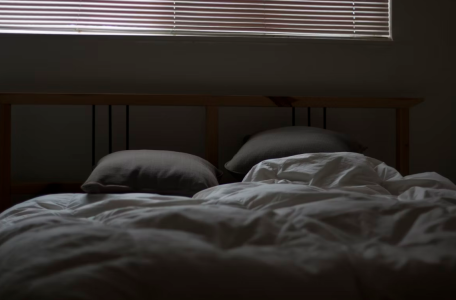How seniors are finding new purpose with a simple New Year’s tradition
- Replies 0
Some nights stretch longer than they should, while others disappear in a blink, leaving you wide awake when the world is asleep.
The rhythm that once guided your rest can easily drift, and before long, mornings arrive with a fog that refuses to lift.
Finding balance again isn’t about forcing sleep but rebuilding the quiet rituals that invite it naturally. With patience and small, deliberate changes, the body can learn to rest when it’s meant to.
A consistent sleep routine does more than help you fall asleep on time—it keeps your body’s internal clock running smoothly.
Humans thrive on patterns, and the cues that prepare you for bed, from dimming the lights to brushing your teeth, tell your brain it’s time to slow down.
Over time, these habits become automatic, helping you fall asleep faster and wake feeling refreshed. A dependable sleep rhythm supports both mental clarity and physical health throughout the day.
The body’s circadian rhythm works like an internal conductor, signaling when to be alert and when to rest.
Light exposure is a key influence—bright light in the morning encourages wakefulness, while darkness at night signals the body to release melatonin.

This natural timing helps keep the mind and body in sync with the day-night cycle. When these rhythms stay steady, everything from mood to metabolism benefits.
A variety of factors can easily throw this balance off course. Jet lag, shift work, and fluctuating bedtimes can confuse the internal clock, while artificial light from phones and televisions sends mixed signals about when it’s time to rest.
Even caffeine, stress, or staying up late for social activities can make it difficult to sleep when you need to. Over time, inconsistent sleep schedules create a cycle of fatigue that’s hard to break.
The key to resetting your sleep routine is gradual, steady change. Choose a bedtime and wake-up time that allow at least seven hours of rest and stick to them every day—even on weekends.
Also read: Struggling to Sleep in a New Place? Here's Why It Happens and How to Overcome It!
Adjust in small 15- to 30-minute increments until your new rhythm feels natural. Consistency helps retrain your body to fall asleep and wake up at predictable times.
There’s no universal “perfect” bedtime, but aligning your schedule as closely with daylight as possible helps reinforce your circadian rhythm.
Mornings should start with exposure to natural light, while evenings should signal calm and darkness. Try to wind down with quiet activities as the sun sets, creating a daily rhythm that your body can rely on. The goal is regularity, not rigidity, so make your schedule realistic for your life.
Beyond timing, healthy sleep hygiene reinforces your efforts. Exposure to morning light boosts alertness, while cutting screen time an hour before bed reduces stimulation.
Regular exercise, even light walks, improves rest quality, but avoid vigorous workouts right before sleep. A calm bedtime routine—stretching, reading, or gentle breathing—tells your body it’s time to power down.
Avoiding caffeine and alcohol before bed makes a big difference. While caffeine can linger in the system and delay sleep, alcohol often leads to restless nights and frequent awakenings.
Keep naps short and early in the afternoon to prevent nighttime disruptions. A cool, quiet, and dark bedroom completes the environment that supports deep rest.
“Most of the time when people can’t sleep, they look towards an over-the-counter supplement or medication to fix the problem. However, for most people small changes to one’s sleep routine and habits will be the most effective way to get a better night’s rest.” Dr. Dustin Cotliar, Sleep Physician
Also read: Sleep better instantly: The secret sleeping position experts swear by!
For those who continue to struggle, medical treatments can help reset the body’s clock. Melatonin supplements can encourage sleep onset, while light therapy provides a boost of morning brightness to restore rhythm.
Cognitive behavioral therapy for insomnia teaches new ways to handle thoughts and habits that interfere with rest. These methods help align sleep patterns naturally, without relying on short-term fixes.
Pulling an all-nighter may seem like a quick reset, but it only disrupts sleep stages further and impairs thinking the next day.
Deprivation leads to temporary confusion in the brain’s sleep cycles, especially during REM rebound. Instead, gentle adjustments over several days create lasting improvement. Patience pays off when retraining your body to rest well.
Read next:

Quality rest is within reach once you rebuild the rhythm your body has been missing. Start small, stay steady, and give yourself time to adjust. The reward is clearer mornings, calmer nights, and renewed energy for the day ahead. What’s one simple change you’ll try tonight to get your sleep schedule back on track?
The rhythm that once guided your rest can easily drift, and before long, mornings arrive with a fog that refuses to lift.
Finding balance again isn’t about forcing sleep but rebuilding the quiet rituals that invite it naturally. With patience and small, deliberate changes, the body can learn to rest when it’s meant to.
A consistent sleep routine does more than help you fall asleep on time—it keeps your body’s internal clock running smoothly.
Humans thrive on patterns, and the cues that prepare you for bed, from dimming the lights to brushing your teeth, tell your brain it’s time to slow down.
Over time, these habits become automatic, helping you fall asleep faster and wake feeling refreshed. A dependable sleep rhythm supports both mental clarity and physical health throughout the day.
The body’s circadian rhythm works like an internal conductor, signaling when to be alert and when to rest.
Light exposure is a key influence—bright light in the morning encourages wakefulness, while darkness at night signals the body to release melatonin.

How seniors are finding new purpose with a simple New Year’s tradition. Image source: Quin Stevenson / Unsplash
This natural timing helps keep the mind and body in sync with the day-night cycle. When these rhythms stay steady, everything from mood to metabolism benefits.
A variety of factors can easily throw this balance off course. Jet lag, shift work, and fluctuating bedtimes can confuse the internal clock, while artificial light from phones and televisions sends mixed signals about when it’s time to rest.
Even caffeine, stress, or staying up late for social activities can make it difficult to sleep when you need to. Over time, inconsistent sleep schedules create a cycle of fatigue that’s hard to break.
The key to resetting your sleep routine is gradual, steady change. Choose a bedtime and wake-up time that allow at least seven hours of rest and stick to them every day—even on weekends.
Also read: Struggling to Sleep in a New Place? Here's Why It Happens and How to Overcome It!
Adjust in small 15- to 30-minute increments until your new rhythm feels natural. Consistency helps retrain your body to fall asleep and wake up at predictable times.
There’s no universal “perfect” bedtime, but aligning your schedule as closely with daylight as possible helps reinforce your circadian rhythm.
Mornings should start with exposure to natural light, while evenings should signal calm and darkness. Try to wind down with quiet activities as the sun sets, creating a daily rhythm that your body can rely on. The goal is regularity, not rigidity, so make your schedule realistic for your life.
Beyond timing, healthy sleep hygiene reinforces your efforts. Exposure to morning light boosts alertness, while cutting screen time an hour before bed reduces stimulation.
Regular exercise, even light walks, improves rest quality, but avoid vigorous workouts right before sleep. A calm bedtime routine—stretching, reading, or gentle breathing—tells your body it’s time to power down.
Avoiding caffeine and alcohol before bed makes a big difference. While caffeine can linger in the system and delay sleep, alcohol often leads to restless nights and frequent awakenings.
Keep naps short and early in the afternoon to prevent nighttime disruptions. A cool, quiet, and dark bedroom completes the environment that supports deep rest.
“Most of the time when people can’t sleep, they look towards an over-the-counter supplement or medication to fix the problem. However, for most people small changes to one’s sleep routine and habits will be the most effective way to get a better night’s rest.” Dr. Dustin Cotliar, Sleep Physician
Also read: Sleep better instantly: The secret sleeping position experts swear by!
For those who continue to struggle, medical treatments can help reset the body’s clock. Melatonin supplements can encourage sleep onset, while light therapy provides a boost of morning brightness to restore rhythm.
Cognitive behavioral therapy for insomnia teaches new ways to handle thoughts and habits that interfere with rest. These methods help align sleep patterns naturally, without relying on short-term fixes.
Pulling an all-nighter may seem like a quick reset, but it only disrupts sleep stages further and impairs thinking the next day.
Deprivation leads to temporary confusion in the brain’s sleep cycles, especially during REM rebound. Instead, gentle adjustments over several days create lasting improvement. Patience pays off when retraining your body to rest well.
Read next:
- Say goodbye to back pain with these sleep positions – you won’t believe #3!
- The secret to your best sleep ever—doctors swear by this!
Key Takeaways
- Establishing a consistent routine, limiting stimulants, and managing light exposure all play key roles in restoring healthy sleep.
- Gradual changes to bedtime and wake-up times are more effective than drastic shifts.
- Good sleep hygiene, supported by relaxation and consistency, helps synchronize the body’s internal clock.
- For persistent problems, tools like light therapy, melatonin, or behavioral strategies can make long-term improvements possible.






